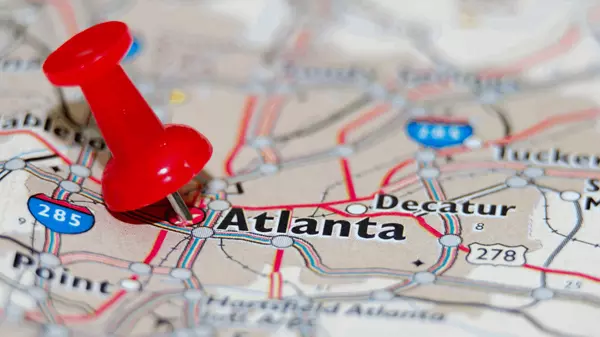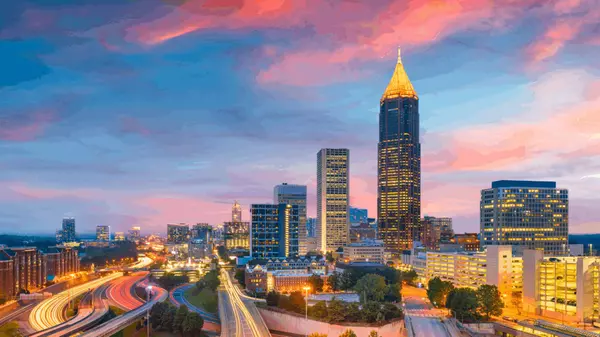Avoid Moving to Atlanta Unless You Can Handle These 9 Things
Thinking about relocating to Atlanta, Georgia? You’re certainly not alone. As one of the fastest-growing metro areas in the United States, Atlanta is attracting transplants from across the country with its robust job market, thriving arts and culture scene, diverse communities, and Southern charm. But despite all of its benefits, Atlanta also has its share of challenges, some of which may catch newcomers off guard.
Before you make a major move, it's important to get an honest look at what it’s really like to live in Atlanta. Beyond the skyline, sports teams, and sweet tea, there are a few things you need to know. In this blog, we’ll break down nine of the most common concerns that residents raise about life in Atlanta. These aren’t deal breakers for everyone, but they are real factors worth considering before you commit to calling Atlanta home.
Let’s take a closer look at what you need to be prepared for if you’re thinking of making the move.
1. Atlanta Traffic Is Notoriously Bad
Let’s start with the obvious: traffic in Atlanta is a daily reality, and it is not for the faint of heart. The city is a major transportation hub with several key interstates converging in and around the downtown area, including I-75, I-85, and I-285. While this infrastructure connects the metro area, it also creates severe bottlenecks, especially during peak commute hours.
The average commute time in Atlanta can easily stretch to 45 minutes or longer, even for distances that seem relatively short. For those living outside the Perimeter (I-285), commuting into the city for work or events can feel like navigating a maze of gridlock, detours, and unpredictable delays.
If you're used to walkable urban living or reliable transit systems, Atlanta’s car-dependent layout and constant congestion might be a major lifestyle shift.
2. Springtime Allergies Are Intense
Every spring, Atlanta bursts into color as flowers bloom and trees fill with new life. It’s beautiful, but for allergy sufferers, it can be brutal. The city experiences one of the most intense pollen seasons in the country. Yellow pollen dust coats everything, cars, porches, sidewalks, and even your clothing if you're outside for more than a few minutes.
Those with sensitivities to pollen should expect several weeks of sneezing, itchy eyes, sinus congestion, and general discomfort. Many residents rely on daily allergy medication, air purifiers at home, and even medical consultations to manage their symptoms. If you’re moving from a region with milder pollen levels, the adjustment could be significant.
3. Summer Heat and Humidity Are No Joke
Atlanta’s climate is classified as humid subtropical, and that means hot, sticky summers that can take a toll on even the most heat-tolerant individuals. During the summer months, daytime highs frequently reach the 90s (Fahrenheit), and it’s not uncommon for temperatures to exceed 100 degrees. What makes it feel even more intense is the humidity, which can be stifling and unrelenting, even after the sun goes down.
Newcomers from cooler climates often find Atlanta’s summer weather overwhelming. It can affect your outdoor lifestyle, increase your reliance on air conditioning, and spike your electricity bills. If you enjoy spending time outside, plan to do most of your activities in the early morning or later in the evening.
4. Public Transportation Is Limited
While Atlanta does have a public transportation system, known as MARTA (Metropolitan Atlanta Rapid Transit Authority), it is not nearly as comprehensive or accessible as those in many other large cities. The rail system is limited to a few key lines, and although bus service extends farther, coverage and frequency can be inconsistent.
If you’re planning to move to Atlanta without a vehicle, it’s important to understand that your mobility options will be constrained unless you live and work along one of the MARTA lines. Ride-sharing services and car ownership remain the primary means of getting around for most residents.
5. The Bugs Are Bigger in the South
One of the more surprising realities of Atlanta living is the insect population. The city’s warm, humid climate makes it a haven for bugs of all kinds, including some large and unwelcome ones. Mosquitoes are ever-present in the summer, especially near wooded areas or bodies of water. But the real shock for many newcomers is the palmetto bug, a large, flying cockroach that tends to find its way indoors.
These pests are more common in older homes and neighborhoods with mature landscaping, but even newer properties aren't immune. Regular pest control services are the norm here, and many residents maintain strict cleanliness and sealing practices to keep bugs at bay.
6. Housing Costs Are Rising
Atlanta was once celebrated for its affordability, especially compared to coastal cities like New York or San Francisco. While it still offers relatively good value for a large metro area, prices have increased sharply in recent years. Housing demand has surged, and that has driven up the cost of both homeownership and rent.
Popular neighborhoods like Midtown, Inman Park, and East Atlanta have seen dramatic increases in property values. Rental rates have climbed, too, making it more difficult for newcomers to find affordable housing, especially if they’re looking for modern amenities or central locations. First-time buyers and renters should budget carefully and be prepared for competition.
7. Crime Is a Concern in Some Areas
As with any large city, crime in Atlanta varies widely depending on the neighborhood. While the city is home to many safe, welcoming communities, there are areas where property crime, theft, and even violent crime are more common. It’s crucial to do thorough research before choosing a place to live.
Prospective residents should review crime statistics, speak to locals, and visit neighborhoods in person, both during the day and at night. Online resources such as neighborhood forums, police department maps, and real estate platforms can provide helpful insight into safety trends.
8. The City Is Extremely Spread Out
Unlike cities with dense urban cores, Atlanta is known for its sprawl. The greater Atlanta metro area encompasses dozens of suburbs and satellite cities, each with its own culture, school system, and community feel. This geographic spread makes Atlanta both diverse and decentralized, but it also means a lot of driving.
Many people live in one part of the metro area and work in another, resulting in lengthy daily commutes. Finding the right neighborhood can take time, and balancing your housing preferences with commute requirements and lifestyle needs is a real puzzle. If you're looking for walkability or easy access to everything in one place, Atlanta may require a major mindset shift.
9. Ice Storms Can Paralyze the City
Atlanta does not receive regular snowfall, but it does experience occasional ice storms. When this happens, the city’s limited infrastructure for dealing with winter weather becomes apparent. Even a small amount of ice can shut down roads, schools, and businesses, leading to significant disruptions.
In rare cases, like the infamous 2014 storm, people have become stranded in their vehicles on highways overnight due to unexpected freezes. These storms are infrequent, but when they occur, they cause chaos. New residents should prepare by keeping emergency supplies on hand and planning to stay put when severe weather is forecast.
Is Atlanta Right for You?
Atlanta is a dynamic and rewarding place to live, with exceptional opportunities in business, education, the arts, and community life. However, it’s not without its challenges. From relentless traffic and soaring temperatures to limited transit and seasonal allergies, living in Atlanta requires a certain amount of resilience and a realistic perspective.
If you’re the type of person who can roll with the punches, adapt to change, and embrace the quirks of a rapidly growing city, you may find Atlanta to be everything you’re looking for and more. But if the issues outlined above sound like more than you're willing to handle, it’s better to know that now, before you make the move.
Still curious about relocating? Have questions about neighborhoods, schools, or the job market? Reach out today. I’d be happy to help you navigate the move and discover the parts of Atlanta that make it truly great.
Categories
Recent Posts
GET MORE INFORMATION
Agent | License ID: 431782


